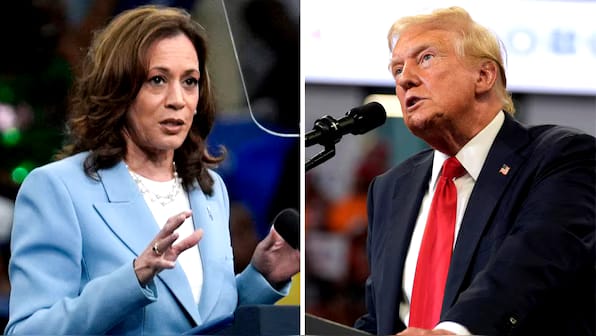FIRSTPOST
Harris calls Trump ‘not very serious’ on economy but falls short of laying out her concrete plans
While she attacked Trump’s economic policy agendas, the vice president dodged to answer specifics about her own economic proposals read more
This combination of photos taken at campaign rallies in Atlanta shows Vice President Kamala Harris on July 30, 2024, left, and Republican presidential candidate former President Donald Trump on Aug. 3. File Image: AP
As the race for the White House intensifies, US Vice President Kamala Harris slammed her Republican rival and former US President Donald Trump’s economic policies. In a one-on-one interview with MSNBC, Harris criticised Trump’s calls for broad tariff hikes and insisted that the 79-year-old Republican firebrand was “not very serious”.
While she attacked Trump’s economic policy agendas, the vice president dodged to answer specifics about her own economic proposals. “You don’t just throw around the idea of just tariffs across the board. And that’s part of the problem with Donald Trump,” Harris told MSNBC’s Stephanie Ruhle in a brief clip previewing an interview set to air later Wednesday.
Kamala Harris to MSNBC: “Frankly, and I say this in all sincerity, he’s just not very serious about how he thinks about some of these issues. And one must be serious and have a plan that’s not just a talking point ending in an exclamation at a political rally.
Mexicans Protest as 10 Years Passed Since Iguala Mass Kidnapping
In the clip of the same interview, however, Harris declined to lay out a road map on how exactly she would achieve some of her own economic plans. Ever since Harris entered the presidential race after US President Joe Biden ended his re-election bid, she faced criticism for rarely sitting for interviews and holding news conferences.
“Frankly, and I say this in all sincerity, he’s just not very serious about how he thinks about some of these issues. And one must be serious and have a plan that’s not just a talking point ending in an exclamation at a political rally,” she added.
What is Trump saying on the matter?
The former president has maintained that he would slap steep tariffs on companies that don’t manufacture their goods in the United States. He insisted that these tariffs would raise hundreds of billions of dollars that would ultimately help the American people.
The Republican presidential nominee floated the idea of imposing a 200 per cent tariff on auto imports from Mexico, as well as another tariff upward of 60 per cent on all Chinese imports.
He rejected the claims made by several economists that the companies would pass those costs to the customers through higher prices.
Harris falls short of laying out a concrete plan
While elaborating on her economic agenda, Harris told MSNBC that the United States is “going to have to raise corporate taxes” to pay for her economic proposals, such as an expanded child tax credit, downpayment assistance for first-time homebuyers and more. But in the clip, she was not seen specifying exactly how she would raise those taxes if the GOP holds the Senate majority following the November polls.
“It’s about paying their fair share,” she said while speaking about big corporations and wealthy Americans. “I am not mad at anyone for achieving success, but everyone should pay their fair share,” she added.
The interview clip was released shortly after Harris delivered an economic-focused speech in Pittsburgh during which she pledged to expand the nation’s manufacturing industry. “We will prioritize investments for strengthening factory towns, retooling existing factories, hiring locally and working with unions because no one that grows up in America’s greatest industrial or agricultural centres should be abandoned,” Harris said in her address at the Economic Club of Pittsburgh.
Harris told MSNBC, that Trump left office with “the worst economy since the Great Depression,” pointing to declines in manufacturing jobs under the former president whose last year in office also saw the economy dented by the coronavirus pandemic. She insisted that Trump’s plans would only benefit wealthy people.
“Donald Trump has a history of taking care of very rich people,” Harris said. “My perspective on the economy is when you grow the middle class, America’s economy is stronger,” she concluded


